Exam Results
A Level Results are in...now what? Exploring apprenticeships as your next step 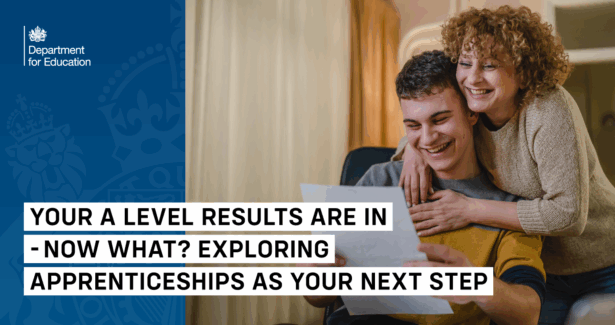
Unsure what your next steps might be now you have your A level results? The department of education article on Exploring apprenticeships may be useful.
Nine Tips for Supporting Your child on Results Day 
See the tips from Parentkind, the Department of Education have released on how to support your child on results day on both A Level and GCSE Results Day
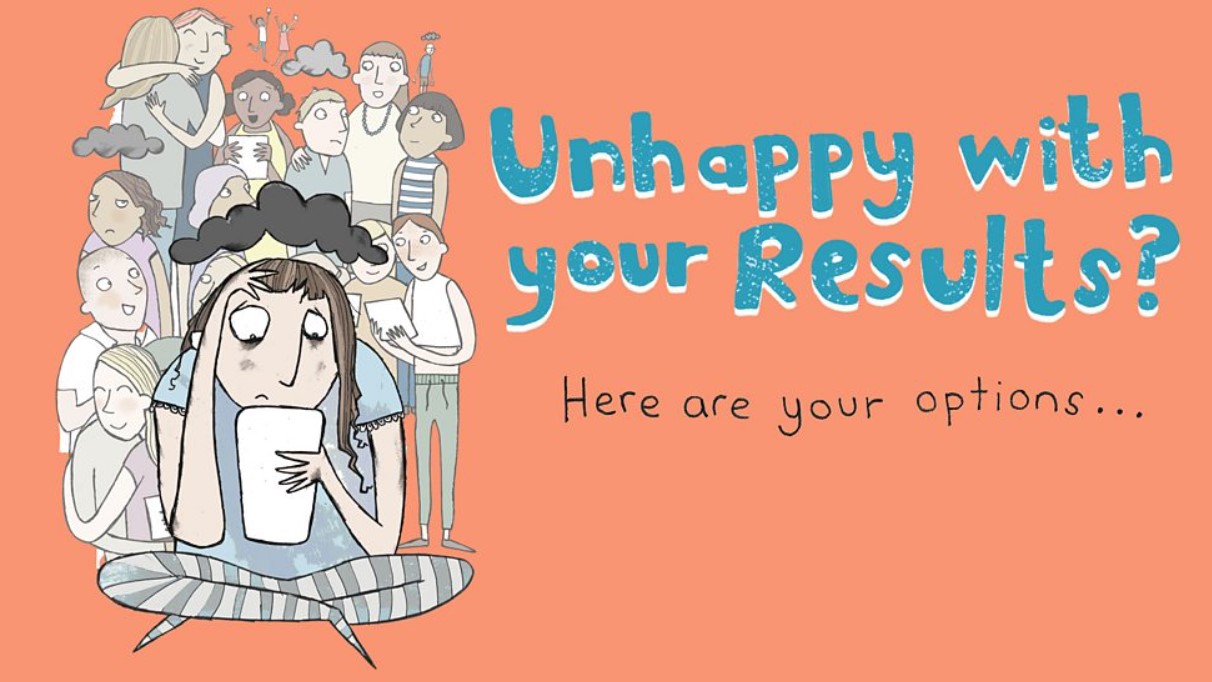
Many young people will be feeling stressed as they await their exam results. They may be feeling a lot of pressure to meet expectations – be it their own, their family’s or their schools – and knowing the impact the results can have on their future plans.
The Six Principles of Nurture give us a greater understanding of how best to support our young people when they feel stressed or anxious. For example, exam result days feature in several major life transitions for young people; from GCSEs to further education, further education to higher education or employment, or university results day.
It’s vital for parents, carers and families to understand that all behaviour is communication and that providing a safe base for young people is key. Your young person may not be able to communicate the stress or anxiety they’re feeling prior to receiving their exam results, so may be withdrawn or isolated, or display challenging behaviour. By providing a safe base, your young person has the opportunity to understand and manage their emotions.
Here’s some of our top tips on how to support your young person in the run up to results day:
- Listen: Your young person may be experiencing a range of emotions as results day approaches. Providing time and space for them to talk is important, whilst acknowledging their hopes or worries, and any pressure they may be feeling.
- Celebrate the effort: Before results day arrives, celebrate how hard they have been working through exam season! Let them know you’re proud of how hard they worked, no matter their results.
- Make flexible plans for the day: Your young person may want to be distracted on the day, depending on their results. Ask them in advance if they have any ideas, or you could suggest a trip out, a walk, dinner out or a takeaway, a movie night, or spending time with friends. Each young person will handle their stress differently so be prepared for plans to change!
- On the day: Be on hand if possible to support them in whatever way they need. And remember that your words matter, so respond to their results carefully and conscientiously.
- Next steps: If your young person is disappointed in their results, they may not want to talk through the next steps on the day, so give them the time and space they need to process. Do some research or talk to the school to understand what options are available – whether it’s retakes, remarking or alternative courses – so that when they’re ready, you can support them to find the next best steps for them.
Remember: grades aren’t everything. Make sure your child feels celebrated and supported regardless of their results! For more information, please see the additional support linked below.
- How Do I Support My Child With GCSE Results Or A Level Results? (actionforchildren.org.uk)
- Parent & Carer Support Groups - Tic+ (ticplus.org.uk)
- Worrying About Your Results (childline.org.uk)
- Dealing with exam results stress | Action Mental Health (amh.org.uk)
- Mental Health Resources For Children and Young People | YoungMinds
- Understanding trauma and adversity | Resources | YoungMinds
- Children and Young People | Mental Health Foundation
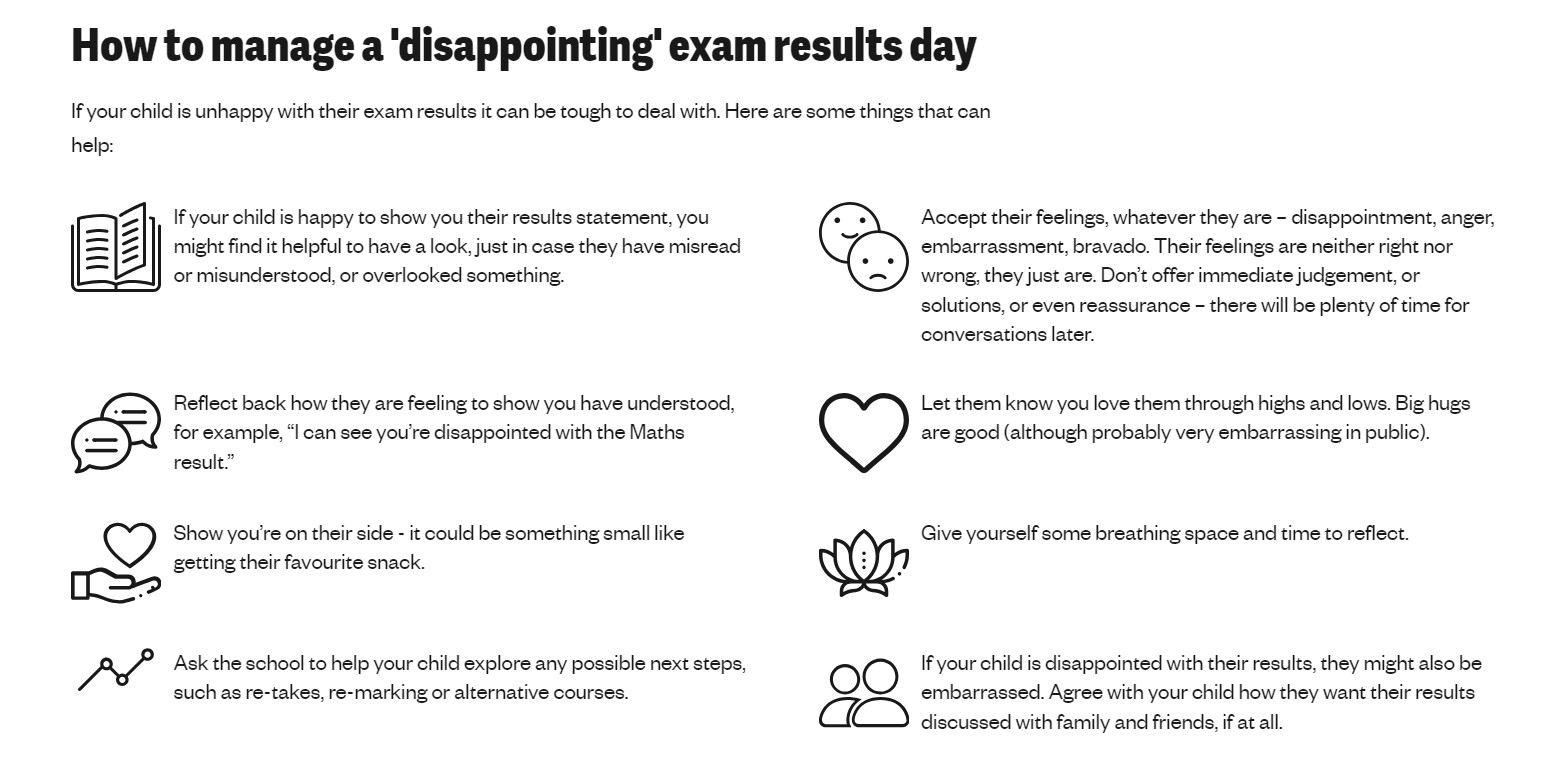
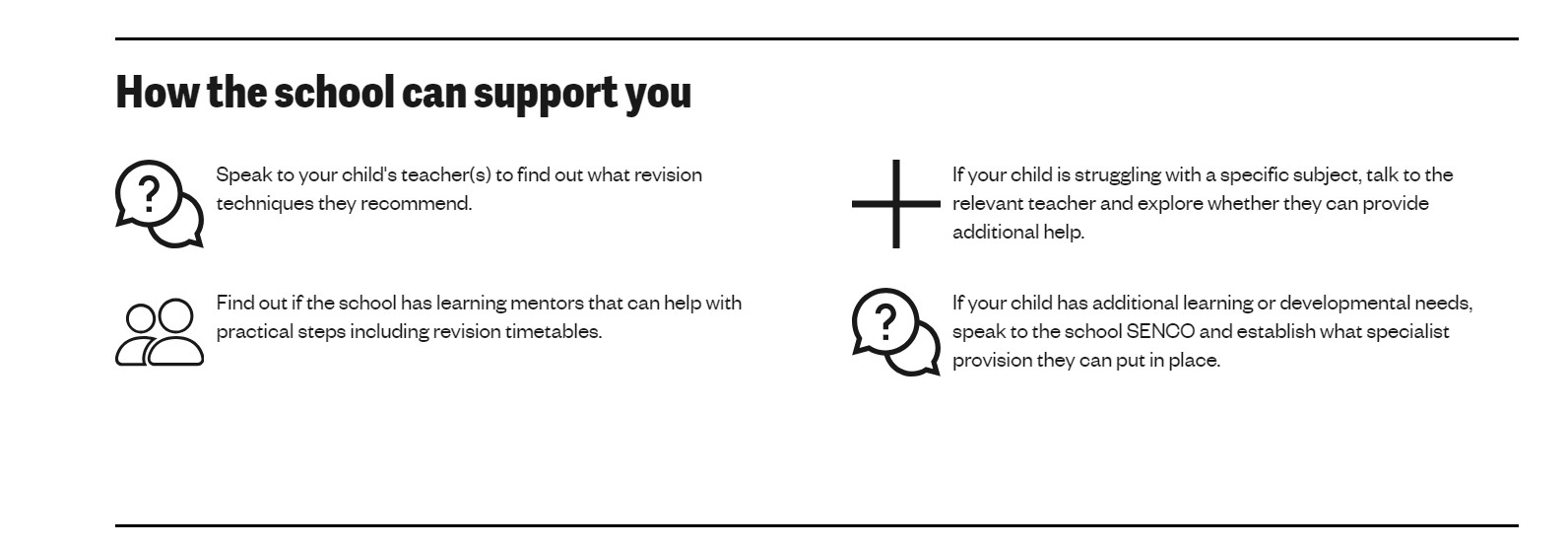
BBC Bitesize Resources
For many young people, the day t hey receive their exam results is one of celebration that marks the positive transition from one stage of their education to the next. However, for some, this day brings with it feelings of anxiety and potential disappointment.
hey receive their exam results is one of celebration that marks the positive transition from one stage of their education to the next. However, for some, this day brings with it feelings of anxiety and potential disappointment.
Read the full blog: How to manage Results Day 2024: Six tips for parents
Kate, a mum from Essex, says that she’s nervous and doesn’t have a plan yet, but knows she still has time to look for advice, “My son is dreading results day. He tried his absolute best, but came out of some exams very disheartened, saying that there were certain things they never got to cover in their online learning.”
David Putwain is a professor of Education and Early Childhood Studies at Liverpool John Moores University. He’s previously taught in schools and colleges and completed a PhD, which looked at the stress and anxiety students feel when preparing for their GCSE exams. He says, “Many, although not all students, are deeply concerned about not wanting to let their parents (or other family members) down. They feel like they’ll be judged if they don’t obtain expected grades. It’s really important to help release some of the pressure of the build-up to results, that parents or carers tell their children they’re loved, valued, and respected, for who they are, not for their academic achievement. This may seem very obvious to you, but not to your children. Reiterate this point after results have been achieved.”
Read other parents fears along with expert advice.
Exam season can be a challenging time for young people. Many feel stressed in the lead-up to their exams and worried in anticipation of their results.
Read this blog on looking after your wellbeing during 2024 results day.
Author of ‘Yes You Can: Ace Your Exams Without Losing your Mind’, Natasha Devon explains how to get yourself ready for results day
Place2Be Resources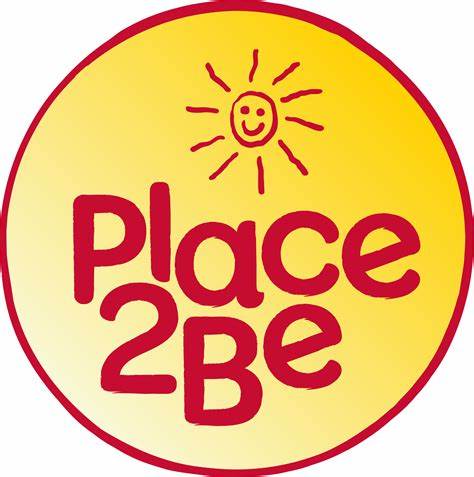
As adults, it can be difficult to know what we can do to support children and young people during this time. Place2Be have created some tip sheets full of practical advice to help young people, schools and families manage stress during exam season.
- Results Day Tips for Students PDF
- Results Day Tips for Schools PDF
- Results Days Tips for Parents/Carers PDF
Shout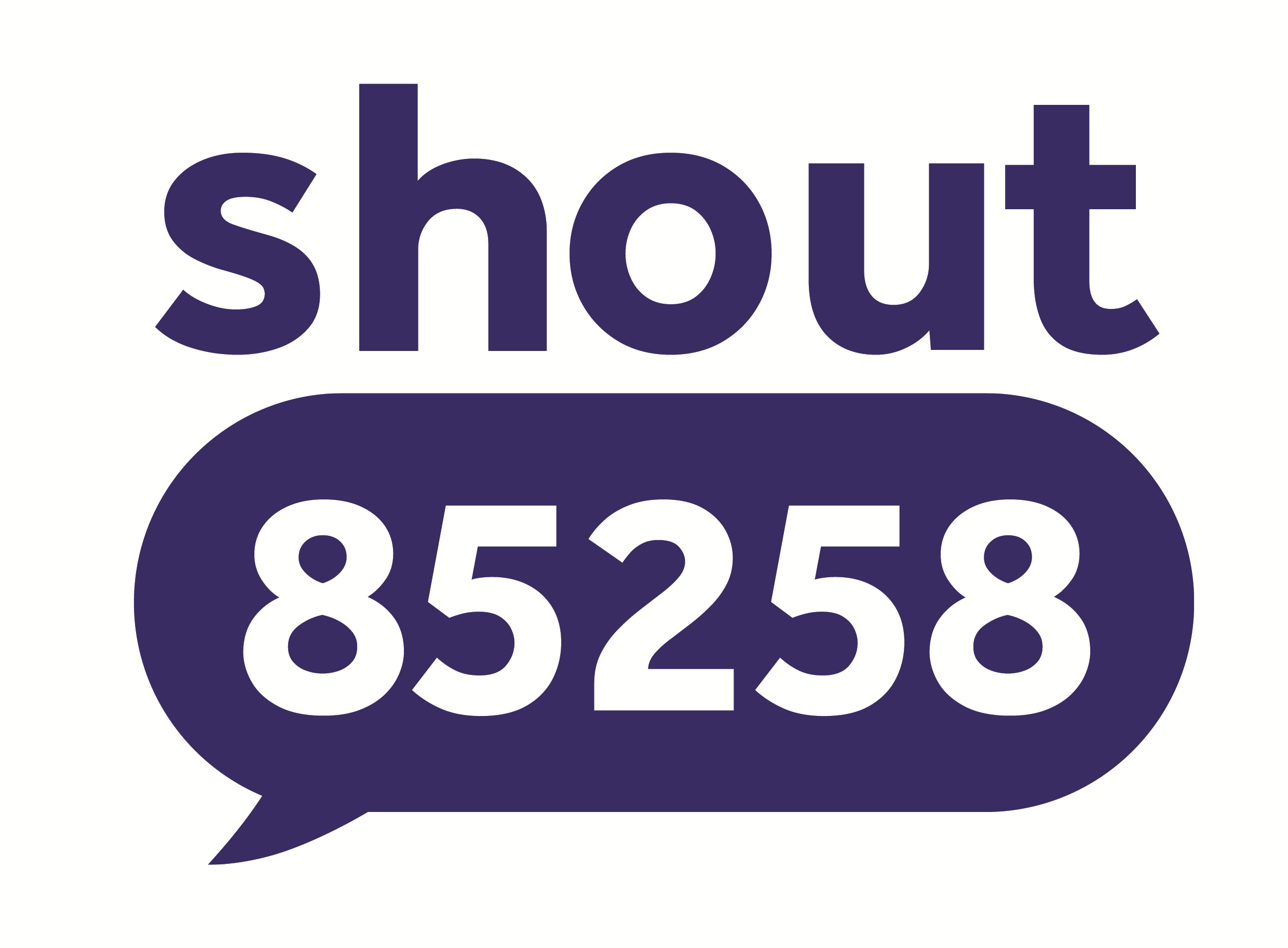
Shout is a free, confidential, 24/7 text support service for anyone in the UK who is struggling to cope.
Video: How shout works.
What is Shout? - How Shout works | Shout 85258 (giveusashout.org)
To start a conversation, text the word 'Shout' to 85258. Trained Shout Volunteers are here to listen at any time of day or night and messages won't appear on your phone bill.
Exam Results – support with your mental wellbeing
NSPCC Childline
We’ve teamed up with NSPCC Childline to share its top tips on how you can best support your child on results day and beyond if they’re feeling nervous.
1. Encourage your child to speak about how they feel
Start the conversation about your child’s future before results day. This will give them time to discuss any anxieties or hopes they might have and will help them feel clearer about their options once their results arrive.
2. Celebrate your child, whatever their results
Whatever results your child receives, results day comes after years of hard work, so it’s important they feel celebrated.
Employers look for a range of skills and these qualifications are a steppingstone to exciting opportunities including study, apprenticeships, work, travel and more.
You can familiarise yourself and your child with all the options out there on the Get the Jump website.
3. Avoid comparison with others
It can be easy for young people to compare themselves to their peers, but each child is unique and their results are too.
Avoid comparing your child to family members or their friends, and instead focus on their own specific achievements.
4. Allow your child to take their time
Your child may find it hard to talk to you about their results so be patient and supportive until they feel ready to discuss about how they feel. Encourage them to speak to their school, college or university.
Help them to make a plan B before results day, and allow them to take their time to think about what they want to do next. Whatever their results, there are lots of options available and there is more than one route into most careers.
Help them think about their choices by writing down a list of pros and cons for each of their options.
5. Encourage your child to speak to another trusted adult
A safe adult – whether this is a teacher or another family member – can help to give useful perspective and advice.
Schools and colleges are well equipped to provide support and expertise on next steps, and your child’s teachers are usually their best first port of call.
If they’re finding it hard to talk to someone close to them or someone at school, let them know they can contact Childline for free, confidential support and advice on 0800 1111 or www.childline.org.uk. Childline is always there for young people to discuss their worries and anxieties on this topic and others.
Young people can also talk to a professional careers adviser for free and get judgment-free, confidential information and advice via the National Careers Service Exam Results helpline, via phone on 0800 100 900 or use webchat.
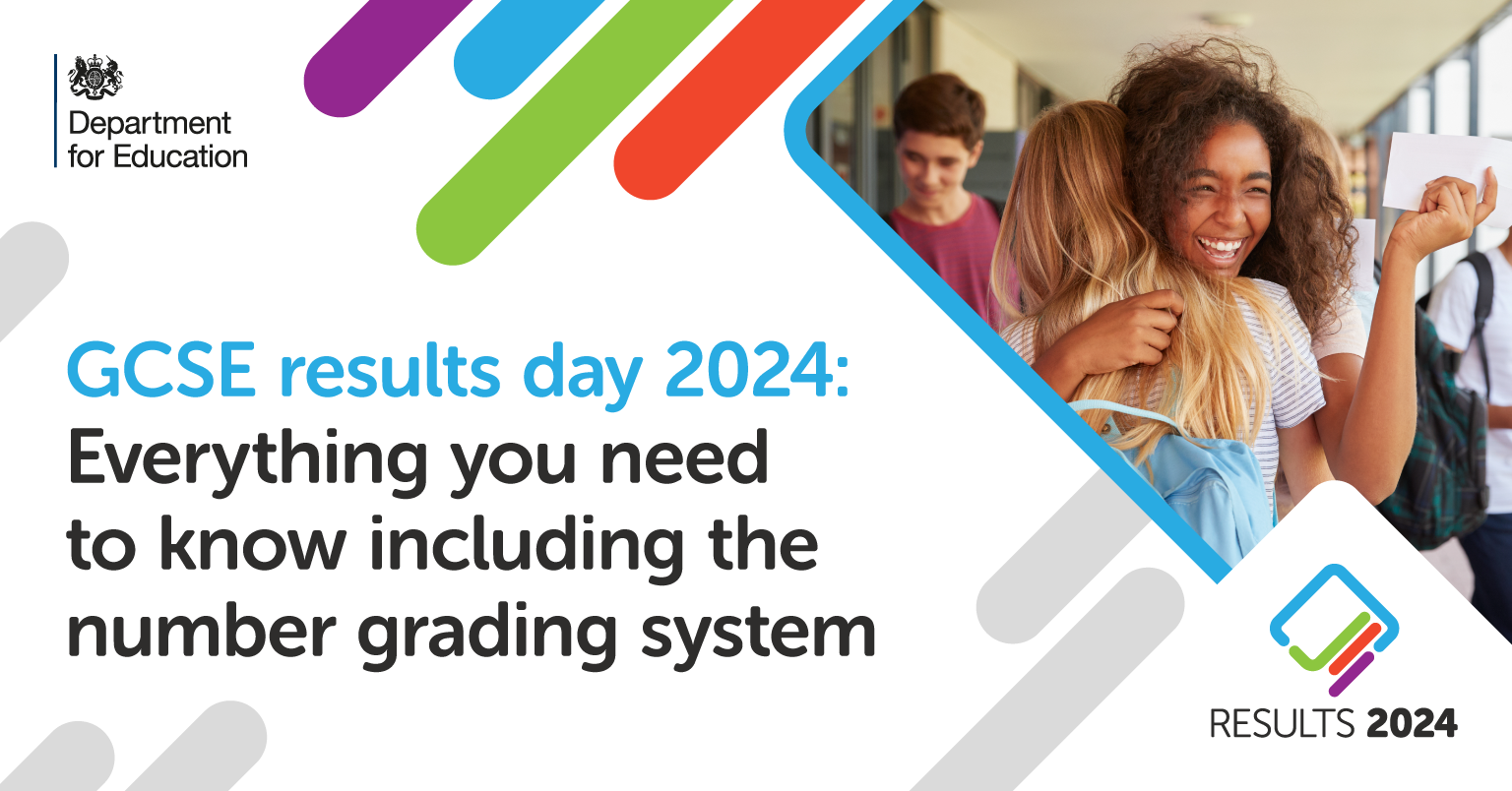 Education Hub advice for parents, pupils and education professionals
Education Hub advice for parents, pupils and education professionals
The Education Hub is a site for parents, pupils and education professionals who have published advice for GCSE and A Level results day 2024
GCSE results day 2024: everything you need to know including the number grading system

A Level Results day 2024: What's next after picking up your A level, T level and VTQ results?
Where to get further help
While we take care to ensure that the organisations we signpost to provide high quality information and advice, we cannot take responsibility for any specific pieces of advice they may offer. We encourage parents and carers to always explore the website of a linked service or organisation to understand who they are and what support they offer before engaging with them.
- Exam Results Helpline
Provides careers advice to help young people and their families decide on options following GCSE, A Level and Nationals results days.
Usually available through August. Opening days and hours may vary each year - check website for details.
If you live in Scotland, call 0808 100 8000.
- YoungMinds Parents Helpline
We support parents and carers who are concerned about their child or young person's mental health. Our Parents Helpline provides detailed advice and information, emotional support and signposting.
You can speak to us over the phone or chat to us online.
You can speak to us over webchat between 9.30am and 4pm from Monday-Friday. When we’re closed, you can still leave us a message in the chat. We’ll reply to you by email in 3-5 working days.
Opening times:
9.30am-4pm, Monday-Friday
- National Careers Service
Provides information, advice and guidance to help young people make decisions about learning, training and work.
Webchat available via the website homepage.
Opening times:
8am - 10pm, 7 days a week
- Student Minds
Supports students to look after their mental health by providing information and advice.
They also provide details about local services offered by universities and information on how you can access support group programmes.
You can call or email for more information (this is not a helpline).
- Student Space
Provides mental health support to students.
Find what support is available at your university.
Webchat service available.
Opening times:
4pm - 11pm, 7 days a week
Tagged under: exam, stress, results, exam results, GCSE, A-level, BTEC, education, mental health
Was the information on this page helpful? 


